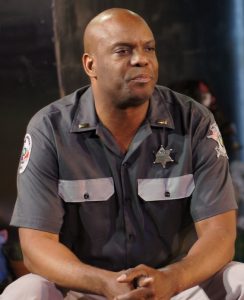The Joke’s on Well-Intentioned ion in a Misdirected ‘Jesus Hates Me’
“The stars,” according to the mentally bankrupt Annie, “don’t twinkle. Stars don’t twinkle. They weep.” Sobering, poetic statement from somebody whose life is a product of both her bipolarism and her slavish devotion to Jesus Christ.
Blood loss is talking, too — Annie’s just fileted her wrists as part of a suicide plan that entails a fall off a ledge, from which she’s literally rescued by son Ethan, the most unlikely hero of all.

Father, forgive Annie (Lisel Gorell-Getz), for she knows not what she does. COURTESY PHOTOS
Such is life in the rural west Texas of “Jesus Hates Me,” Wayne Lemon’s look at one guy’s oppression among a clutch of small-town lifers whose idea of a wild time is a visit to McDonald’s two nights in a row. The incentivized world as we know it is anathema here, and Ethan blames Jesus for having consigned him accordingly. Things get going in this ion theatre company entry when Ethan has a chance to make his break — but as watchable as this hilarious story might be, it’s ruled by the same reflectiveness that spawns classic religious guilt trips the world over.
Jesus had an appointment on opening day — if He does see this show, He’ll smile with customary politeness. Part of that grin, however, is possibly the product of a clench at the jaw.
For all his rough edges, Ethan has a vision for his life beyond the cesspool that is his hometown. The twentysomething former high school football star has a trick knee, no money and a dead-end excuse for a job helping Annie run her Christian-themed putt-putt golf course, which is dotted with Wal-Mart mannequins that represent Bible figures (a beaten, emaciated Jesus is perched on a cross above the 17th hole).

Boone (Richard Johnson, left) and Ethan (Connor Sullivan) state their cases, replete with the appropriate attire, on the sexual orientation of Yankee men.
Now you see why Ethan’s desperate to take up with cooler heads — and when he has a chance for employment at a gay Colorado ski resort, things get predictably worse. The people around him proceed to show their small-town colors even as he ratchets up his aspirations. His friend Trane, the only black cop on the force, is at least a big fish in a small pond; Georgie blames everybody and their moms for his teenage suicide attempt, which only resulted in a destroyed larynx; Lizzy owns the town bar, but that’s because she inherited it from paw; and Boone is an opportunistic slug who reaches a new low when he takes a tumble in the hay with precarious Annie.
It’s not that Annie’s not attractive in her middle age; it’s that her emotional instability (which Lemon equates with her faith) is taking a deadly toll and that Boone is too dimwitted to see that. Those factors, coupled with Ethan’s newfound plans, should rightly make a caricature of Annie’s death — but Lisa Gorell-Getz and Connor Sullivan play it inexplicably straight, right down to the wet one Annie plants on her son in the middle of a post-rescue flap.
Trane’s brazen pot habit and his disdain for his on-duty hat; Lizzy’s long-lived eyes for Ethan; George’s deep bitterness over his survival; Boone’s riff that all Northern men are gay: Like the Crucifixion, if these items aren’t funny, then nothing is funny, and Lemon serves up the dialogue and contexts to prove it. Why, then, the pregnant pauses and rough-and-tumble affectations and realistic treatments that suck away much of the humor? What might be the world’s first religious farce looks more like an executive summary of Jesus’ place in the public mind.

Here’s the only known photo of Trane (Laurence Brown) without some bud behind his ear.
Gorell-Getz and Sullivan are in tune with directors Glenn Paris and Claudio Raygoza, exuding a mother-son familiarity that befits the script. Laurence Brown’s Trane might be imposing and rude, but Brown’s also given the character a palpable sense of duty, evident in a scene that finds him shot in the ass. Dana Fares’ Lizzy probably comes closest to acknowledging her own role in her life dissatisfaction, while Charlie Gange’s Georgie is a world away from that point; both actors illustrate as much quite well. Richard Johnson has the right severe features for Boone, but a little more earthiness would better contrast him with Ethan.
ion is a marvel of technical efficiency in its 49-seat space, and this entry shows it. Raygoza’s great set and lights are in no better use than during the re-enactment of Georgie’s suicide try. Meanwhile, costumer Mary Summerday’s color choices for Lizzy are absolutely spot on, and choreographers Michael Mizerany and George Ye effect the proper divisions of labor.
The Denver production of this play was officially condemned by the Catholic Church (reportedly, no church representative saw it), and it was skewered by the nation’s Christian groups in 2006. For my money, that’s enough to recommend this show with a vengeance.

Lizzy and Ethan (Dana Fares and Connor Sullivan) took their relationship to a higher level once before — and now…
Nonetheless, ion has muted this play’s color and shape, sometimes badly forsaking the wildly funny landscape for a meat-and-potatoes earthiness that might not necessarily apply.
In any event, this show is a trifle compared with its bigger picture, which poses the prospect of Jesus’ divinity as part of us all. Ethan’s lazy crowd, whether or not they know it, illustrate a long-held and daunting prospect for man’s future:
If there is indeed a Second Coming on the horizon (and presuming there was a First), Jesus’ enemies will execute him straightaway, with the same chilling commitment as before.
This review is based on the matinee performance of April 23. Jesus Hates Me runs through May 14 at BLKBOX @ 6th&Penn, 3704 Sixth Ave. in Hillcrest. $14-$32. 619-600-5020, iontheatre.com.

Martin Jones Westlin, principal at editorial consultancy Words Are Not Enough and La Jolla Village News editor emeritus, has been a theater critic and editor/writer for 25 of his 47 years…
More…


